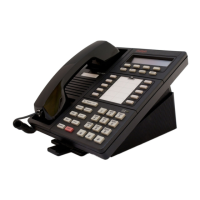MERLIN LEGEND Communications System Release 6.1
System Programming Guide
555-661-111
Issue 1
August 1998
Programming Basics
Page 1-53Product Enhancements
1
Win SPM 1
The System Programming and Maintenance (SPM) software is now available in a
Windows format called
Win SPM
. For Release 6.1 and later systems, Win SPM
provides a graphical user interface (GUI) for those tasks must commonly
performed by the system manager. Pictorial representations of system
components, such as modules and their vintages and the creation of MLX
telephone button labels, appear on Win SPM. Win SPM also provides a
DOS-emulator mode to program tasks not currently supported by the GUI and
to program a MERLIN LEGEND system of Release 6.0 or earlier. Win SPM is
available on CD-ROM and is supported in Windows 95, Windows NT, and
Windows 98.
Windows NT Driver 1
Now available is the MERLIN LEGEND Windows NT PBX driver. When coupled
with the CentreVu Telephony Services application, the driver provides true
server-based Computer Telephony Integration (CTI). The new driver requires a
MERLIN LEGEND system of Release 5.0 or later and servers and PCs that
support the applications.
Release 6.0 Enhancements (February, 1998) 1
Release 6.0 includes all Release 5.0 functionality, plus the enhancements listed
below.
Private Networks 1
In Hybrid/PBX mode systems only, MERLIN LEGEND Communications Systems
can be networked with one another or with DEFINITY
®
Enterprise
Communications Server (ECS) and ProLogix
™
Communications Systems in
private networks. In previous releases, this functionality is available using tie lines,
but users handle calls between networked switches as outside calls. In this
release, dialing the pool access code is not necessary for a call going from one
networked switch to another. Also, delay-start tie trunks or T1 trunks programmed
as PRI can act as
tandem trunks
to connect networked systems.
Available for Hybrid/PBX mode systems, the private network features of the
MERLIN LEGEND Communications System Release 6.0 provide the following
advantages for geographically dispersed organizational sites:
■ Intersystem Calling. In a private network, users on one local system can
call extensions on other systems in the network. Release 6.0 can support
2-, 3-, 4-, or 5-digit dial plans. They dial these extensions as inside calls. To
implement this function, the system manager programs the extension
ranges of remote networked switches to create a non-local dial plan. This
programming does not actually affect numbering on the remote system. To
correctly set up systems for transparent calling among non-local dial plan
extensions, the system manager assigns networking tie and/or PRI tandem
trunks to pools. Then he or she programs as many as 20 patterns,

